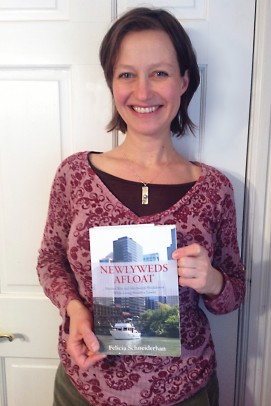Author sets sail on married life afloat

“We could just go places,” says author and former College of Nursing employee Felicia Schneiderhan, who lived on a boat with her husband for two years.
Felicia Schneiderhan was a member of an unusual love triangle — herself, her husband and the boat they lived on.
“Sometimes I felt like the other woman,” she said.
“The boat was Mark’s first love.” Her husband owned the 38-foot trawler, named Mazurka, for two years before he knew her.
Mark and Felicia met in 2005. “His brother married my best friend, and we were both in the wedding,” she said.
Another connection: he was working in UIC’s College of Pharmacy and she in the College of Nursing.
After they wed in 2006, “My commitment was that I would try living on the boat for a year,” Schneiderhan said. “If I hated it, we would move to land.”
And? “I loved it.”
Her recently published book about their story is Newlyweds Afloat: Married Bliss and Mechanical Breakdowns While Living Aboard a Trawler.
Schneiderhan said the best thing about living afloat was that “we got to learn how to work together in a strange situation,” as they docked at River City during the winter and at Monroe and Belmont harbors in the summer.
“We would just go places,” she said. “On the lake in front of the Hancock Center, we’d just drop the anchor and have dinner.”
The worst thing, she said, was dealing with those aforementioned mechanical breakdowns.
The Mazurka has four different heating systems — an electric heater, a diesel furnace, space heaters and a system of wrapping the top of the boat in plastic. Five, if you count Schneiderhan’s two cats.
“Something was always going wrong with the boat,” she said. “At Monroe Harbor, there was no power from shore; we had a generator. But two days after we got married it quit, and it never worked since.”
During the newlyweds’ first winter together, the river froze, locking the boat in the ice. The adventure is recounted in a chapter of Schneiderhan’s book titled “Surviving Shackleton’s Endurance.” (Explorer Ernest Shackleton got stuck in Antarctic ice in 1915. It crushed his ship, the Endurance, and he had to abandon ship.)
The Schneiderhans had a better experience.
“Mark used an auger to drill a hole in the ice at the front of the boat, and put a de-icer [a fan] under the water,” she said. It worked.
After two years on the boat, the couple decided to come ashore.
“We wanted to have kids, and we weren’t sure how to do that on a boat living downtown,” she said. They moved to Duluth, Minnesota, but kept the Mazurka for summer travel.
A life-threatening incident involving one of their children took them off the water indefinitely.
Schneiderhan was aboard with her then-month-old daughter, Esther, strapped to her, and her oldest son, Rafael, then 2. As Rafael was climbing off the boat and down a stepladder, he missed a step, falling to the deck, then rolling into the water.
“I have spent more than a few days flogging myself for not putting him in a lifejacket that afternoon,” she said. “But we were only going to be there for a minute.”
Still wearing her newborn, Schneiderhan jumped in.
“I didn’t know where he was. Mark had jumped in on the other side of the dock. My son ‘swam’ under the dock to him. It was a bizarre, terrifying situation.”
Schneiderhan grew up in Moline. She received a bachelor’s degree in theatre at Northwestern University and a master of fine arts from Columbia College.
At UIC she was assistant to the head of periodontics for a year and assistant director of advancement in the College of Nursing for two years.
Now she is a freelance writer.
Her poem “Summer Afternoon in the Kitchen” won the Rose Warner Prize for Poetry in the Freshwater Review, Spring 2012.
Her short story “Dead During the Brewers’ Game” won the Editors’ Choice Award for Fiction from the Thunderbird Review 2014.
She won third place in an Illinois Women’s Press Association 2006 Communications Competition, for features in a nondaily newspaper category, “Forensic Pathologists and Real-Life CSI.”
Mark is an associate professor of pharmacy at the University of Minnesota. Rafael is now 5, Esther is 3, and they have a little 1-year-old brother, Anton.
Schneiderhan’s favorite pastimes are “anything outdoors, which is why I like life on the boat,” she said. “It’s part of the reason we live in northern Minnesota, with a lot of skiing, hiking and running.”
After the accident involving Rafael, “I said, ‘I’m not taking these two small kids on the boat,’ and for two years we didn’t put the boat in the water,” she said.
“But, I think it was the book coming out, we decided we would try it again. We went all around Lake Superior this summer.”
Categories
